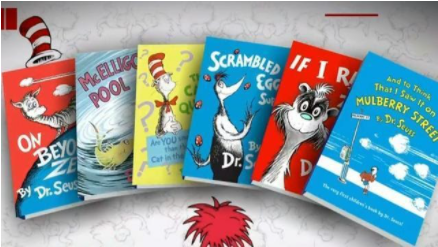Is Cancel Culture Striking Fairly?
March 22, 2021
On March 2, Dr. Seuss’s birthday, Dr. Seuss Enterprises announced on their website that they would stop the printing of 6 of their books. The statement listed: And to Think That I Saw It on Mulberry Street (1937), If I Ran the Zoo (1950), McElligot’s Pool (1947), On Beyond Zebra! (1955), Scrambled Eggs Super! (1953), and The Cat’s Quizzer (1976) as the titles being discontinued.
“We are committed to action,” Dr. Seuss Enterprises stated. “These books portray people in ways that are hurtful and wrong.”
The decision to stop publication and licensing for the 6 books was made last year after Dr. Seuss Enterprises worked with advisors who evaluated the titles. Much of the public has opinions either for or against the decision, and it seems Dr. Seuss Enterprises is not making any further comments about their statement or actions. This leaves the rest of us to wonder if the right decision was made.

The idea of “Cancel Culture”, as it has come to be known, is slowly sifting through many established franchises and either removing them or slapping a disclaimer on them. The timing seems to be appropriate for some and not for others. The looming question is if cancel culture is being fair about its judgment as well as its motivations.
Protecting the minds of children seems to be the priority, but what can be gained by hiding the history of the culture from them in literary form or in any other form for that matter?
There are many books which are considered classics such as Huckleberry Finn written by American Author Mark Twain in 1884, in which the n-word is used multiple times portraying a historically accurate picture of the cultural behavior at the time.
If the goal is looking seriously into books branded as offensive and removing them, then school curriculums could begin shifting in a different direction where the history on those pages could be lost for good. Touching the surface of social issues could be a temporary solution and good conversation starter by cancel culture. Yet there is still real evidence of racism in the world which seems to have no answer.
Ravi Zacharias the late christian apologist and author said to a question posed by an anonymous news reporter about moral ethics at an open forum, “The reason we are against racism is because a person’s race is sacred. A person’s ethnicity is sacred. You cannot violate it. My race is sacred; your race is sacred; I dare not violate it.”
To take a stand against violations such as racism would be a continuous effort by all in society, and using examples of such would have a beneficial effect. What the public considers before giving an opinion about any social issue is of great importance to the structure of society. Merely picking what to be upset about is the answer for continued discord.
All of the books discontinued by Dr. Seuss Enterprises have various cultures being represented in an unflattering way.
Some of the illustrations are clearly evidence of the cultural norm at the time, while others are disturbing, such as the depiction of black people resembling monkeys in If I Ran the Zoo.

Any and all races have a right to feel some offense, and yet there is something about certain minorities not being considered people at certain historical times that keeps alluding the present social mentality. The heart of the issue seems to be based on doing the right thing and the focus is lost when people are told what to be angry about.
Co-Authors of On the Perpetuation of Ignorance Dr. Steven Shepherd and Dr. Aaron C. Kay published in Journal of Personality and Social Psychology wrote, “Individuals are often confronted with information that they do not know how to comprehend or evaluate, even though this information can be of critical importance to the self (or society as a whole).”
Believing in the feelings of the culture seems to be an easy sell for all sides of the issues, but then arises a more prominent issue of missing the point. There are those frustrated with the facts not being taken into consideration before making a decision that can steer the culture down into the mire.
Many have taken to buying the remaining prints of the books canceled by Dr. Seuss Enterprises and have started selling them online. Some prices start at around $200 while others are going for up to around $1900.
Does the action of profiting from a social issue such as racism speak louder as a cultural norm than cancel culture? Again, the motivation of discontinuing any trace of history is key to understanding and learning to grow from past errors.
“Ceasing sales of these books is only part of our commitment,” Dr. Seuss Enterprises stated. The statement by Dr. Seuss Enterprises went on to say they will ensure their product will represent and support all communities and families.

